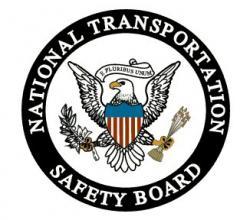Tue, Feb 24, 2009
Recent Update Of NTSB Investigation Seems To Suggest That
Possibilty
 In its continuing investigation of
the January 4, 2009, fatal accident involving a Sikorsky S-76C++
helicopter, operated by PHI, Inc., that crashed in a marsh near
Morgan City, Louisiana (NTSB Accident Number CEN09MA117), the
National Transportation Safety Board is releasing the following
factual information:
In its continuing investigation of
the January 4, 2009, fatal accident involving a Sikorsky S-76C++
helicopter, operated by PHI, Inc., that crashed in a marsh near
Morgan City, Louisiana (NTSB Accident Number CEN09MA117), the
National Transportation Safety Board is releasing the following
factual information:
During the first of two detailed examinations of the wreckage
layout last month in Lafayette, Louisiana, a bird specialist with
the U.S. Department of Agriculture (USDA) examined the helicopter
for evidence of a bird strike. A visual examination did not detect
any such evidence, but a swab was taken from the pilot-side
windscreen. The sample was sent to the Smithsonian Institution
Feather Identification Lab for identification. Results from DNA
testing on that sample showed that microscopic remains of a
hawk variety were present. The swab was taken from an area
of the windscreen that exhibited concentric ring fractures. Similar
concentric rings were visible in the gel coat of the fuselage area
just above the windscreen.
A second detailed examination of the wreckage layout was
conducted this past week in Lafayette, with additional NTSB and
USDA specialists. Additional swabs for bird remains were taken from
the fuselage; empennage; various inlets, including the engines; and
from the rotor hub and main rotor blades. Additionally,
examination revealed the presence of small parts of feathers under
a right side windscreen seal and in the folds of the right side
engine inlet filter.
Portions of the windscreen and composite center post are
continuing to be examined in the NTSB laboratory in Washington, DC
for further structural analysis and a review of material
specificity.
The original production laminated glass windscreens from the
accident helicopter had been removed and replaced by PHI about two
years prior to the accident as part of their normal procedures with
the S-76 fleet in order to prepare for operational mission status.
This helicopter's windscreens were replaced a second time due to
cracking approximately one year prior to the accident. PHI replaces
all of the windscreens in their S-76 fleet with a lighter weight,
cast acrylic windscreen that was approved by the Federal Aviation
Administration (FAA) via a Supplemental Type Certificate (STC) upon
delivery.
The ongoing investigation will involve further analysis of the
information from the cockpit voice and flight data recorders,
detailed examination and analysis of the damage to the cast acrylic
and composite center post, investigation into the windscreen STC
issuance and specifications, research into the potential scenarios
that could cause the loss of engine torque and electrical anomalies
noted on the flight recorders, and the flight crew's response to
the event.
More News
“This recognition was evident during the TBMOPA Annual Convention, where owners and operators clearly expressed their satisfaction with our focus on customer service, and enc>[...]
Overhead Maneuver A series of predetermined maneuvers prescribed for aircraft (often in formation) for entry into the visual flight rules (VFR) traffic pattern and to proceed to a >[...]
Aero Linx: Glenn H. Curtiss Museum The Glenn H. Curtiss Museum, bearing the name of Hammondsport’s favorite son, is located on State Route 54, one half mile south of the vill>[...]
The Flight Instructor Noticed Some Engine Roughness And Diverted Toward Westwinds Airport On November 2, 2025, about 1630 mountain standard time, an experimental amateur-built Just>[...]
From 2014 (YouTube Edition) -- Disclaimer: No Matter What He Tells You, Tom Is Not A Certified Firefighting Pilot While at EAA AirVenture 2014, ANN News Editor, Tom Patton checked >[...]
 Aero-News: Quote of the Day (11.20.25)
Aero-News: Quote of the Day (11.20.25) ANN's Daily Aero-Term (11.20.25): Overhead Maneuver
ANN's Daily Aero-Term (11.20.25): Overhead Maneuver ANN's Daily Aero-Linx (11.20.25)
ANN's Daily Aero-Linx (11.20.25) NTSB Prelim: Just Highlander
NTSB Prelim: Just Highlander Classic Aero-TV: Just Like The 'Real' Thing Redbird/Disneys Dusty FlightSim
Classic Aero-TV: Just Like The 'Real' Thing Redbird/Disneys Dusty FlightSim



